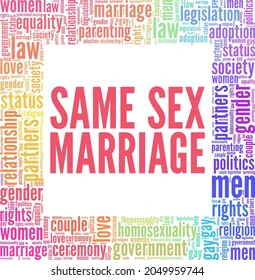Question: Whether to extend right to marry and stablish a family to sexual and gender minority
individuals in India.
landmark cases of the Supreme Court of India: Supriya Chakraborty & Abhay Dang v.
Union of India thr. Its Secretary, Ministry of Law and Justice & other connected cases (2023)
- Introduction: Same-sex marriage refers to the legally or socially recognized marriage
between two people of the same gender. In a same-sex marriage, both partners are either two
men or two women. This type of marriage grants couples the same legal rights, responsibilities,
and benefits as heterosexual marriages, including matters related to property, inheritance, tax
benefits, and parental rights. The recognition of same-sex marriages has been a significant issue
in the fight for LGBTQ+ rights, with proponents arguing that marriage should be available to
all couples, regardless of gender, as a matter of equality and civil rights. As societies have
evolved, many countries and states have legalized same-sex marriage, although it remains a
contentious issue in some regions, often opposed on religious, cultural, or traditional grounds.
- Legality of Same sex marriage: Supriya Chakraborty & Abhay Dang v. Union of India thr.
Its Secretary, Ministry of Law and Justice & other connected cases (2023) are a collection of
landmark cases of the Supreme Court of India, which were filed to consider whether to extend
right to marry and stablish a family to sexual and gender minority individuals in India.
The five-judge bench upheld the validity of the Special Marriage Act, 1954, and held that the
right to marry is not a fundamental right for queer persons.
On 17 October 2023, the Supreme Court ruled unanimously that the legalization of same-sex
marriage is a matter for the Parliament to decide, not the courts. Chief Justice of India D.Y.
Chandrachud said that whether marriage equality is legalised is something parliament must
decide on, and it is not within the court’s remit to create new laws.
He also went on to say that the state must recognise queer unions, even without marriage, and
provide legal safeguards and rights to them. Justice Sanjay Kishan Kaul agreed with this
opinion.
Same-sex marriage in India represents a complex intersection of cultural, legal, and social
dimensions, reflecting the evolving landscape of LGBTQ+ rights in the country. While
homosexuality was decriminalized by the Supreme Court of India in 2018 through the
landmark judgment of Navtej Singh Johar v. Union of India, the Indian Constitution guarantees
equality and non-discrimination, but societal acceptance and legal recognition of same-sex
marriages lag behind these principles.
Challenges: India’s legal framework does not currently recognize same-sex marriages, as
marriage laws are rooted in religious and traditional norms that predominantly define marriage
as a union between a man and a woman.
The opposition to same-sex marriage in India is primarily rooted in cultural and religious
conservatism. Many argue that marriage, as a social institution, is intrinsically linked to
procreation and that same-sex unions challenge the traditional family structure. Religious
bodies, in particular, have expressed strong opposition, citing the sanctity of marriage in
religious texts. Despite this, there is a growing acceptance of LGBTQ+ individuals, especially
in urban areas, fueled by greater visibility, advocacy, and changing social attitudes. Public
discourse on same-sex marriage in India is gradually shifting, with increasing support from
younger generations, civil society, and progressive sections of the media. However, political
will remains a significant hurdle. The government has expressed reluctance to legalize samesex marriages, arguing that such decisions should be left to the legislature rather than the
judiciary. This stance underscores the tension between evolving societal values and the state’s
role in regulating marriage.
Conclusion: The significant aspect is that same-sex unions were recognised in antiquity, not
simply as unions that facilitate sexual activity, but as relationships that foster love, emotional
support, and mutual care.
On 17 October 2023, the Supreme Court ruled unanimously that the legalization of same-sex
marriage is a matter for the Parliament to decide, not the courts.
The debate over same-sex marriage in India is emblematic of the broader struggle for LGBTQ
rights in the country. While legal recognition of same-sex marriages may still be a distant goal,
the ongoing legal battles and changing public attitudes signal a gradual but significant shift in
the Indian socio-legal landscape.
Interestingly, 56% urban Indians, in a survey conductucted by IPSOS India on this issue in
2021, say their views are different about homosexuality, of what they were 5 years ago.
In the same report 44% of Indians expressed support for same-sex marriage, while 18%
opposed it.
According to a multinational survey conducted in 2023 by the Pew Research Center, 53% of
Indians expressed their support for the legal recognition of same-sex marriage.
According to an Indian survey conducted in 2019 by the Mood of the Nation Poll, 62% of
Indians expressed opposition to same-sex marriage, while 24% expressed support.
The mentality of society is changing day by day; however, we argue that the point of view of
society today and in 2030 will remain the same. According to the author and co-author of
this abstract, if the question of same-sex marriage were raised in 2030, the decision could
have been entirely different from what it is today.
“Currently, in our society, the public’s point of view toward same-sex marriage is often
misguided; many believe it is solely about satisfying sexual desires. However, it should be
seen as a relationship that fosters love, emotional support, and mutual care.”


